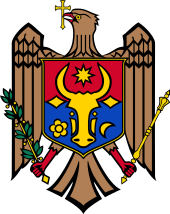|
Moldovan nationality law
Moldovan nationality law dates back to June 2, 2000 and has been amended several times, with the latest modifications being made in 2014. It is based on the Constitution of Moldova (articles 17, 18 and 19). It is mainly based on Jus sanguinis. Dual nationality is allowed, under certain conditions. Under the law, there are provisions for citizenship to be acquired by:
Citizenship by birthThe Moldovan nationality law outlines several categories of persons who are entitled to citizenship; In Moldova, up until 2023, followed the principle of unrestricted jus soli, and any person, regardless of their parents' citizenship status would acquire Moldovan nationality upon birth within the territory. However a modification in 2023 provided for a restricted jus soli law, which provides a permanent residency requirement for births on the territory.[1] However, those under international protection are exempt from that permanent residency requirement. Moldova's jus soli law provides for the international law precedent where foundlings on the territory are entitled to Moldovan nationality, until proven otherwise until attainment of 18 years of age.[2] A child born to at least one Moldovan parent abroad is also considered a Moldovan citizen by birth. Citizenship by recognitionYou may gain Moldovan citizenship by:
Citizenship by naturalisationCitizenship may be granted to anyone who has reached the age of 18, and who meets one of the following criteria:
In addition they must fulfil the following criteria:
Dual citizenshipMoldova permits dual citizenship, for both born and naturalised citizens, however under Moldovan naturalisation law, there exists a category of citizens who may be required to renounce their citizenship.[3] Some countries, however, do not permit multiple citizenship e.g. adults who acquired Moldovan and Japanese citizenship by birth must declare, to the latter's Ministry of Justice, before turning 22, which citizenship they want to keep. ControversyOn 28 September 2017, a new law allowing individuals to buy their citizenship for a fixed sum took effect. Moldovan pro-Russian president Igor Dodon tried to bring in investments from Russia stating that "The Moldovan passport could allow them to travel in Europe freely."[4] These provisions were repealed by a law that entered into force on September 1, 2020.[5] References
External links
|
||||||||||||
